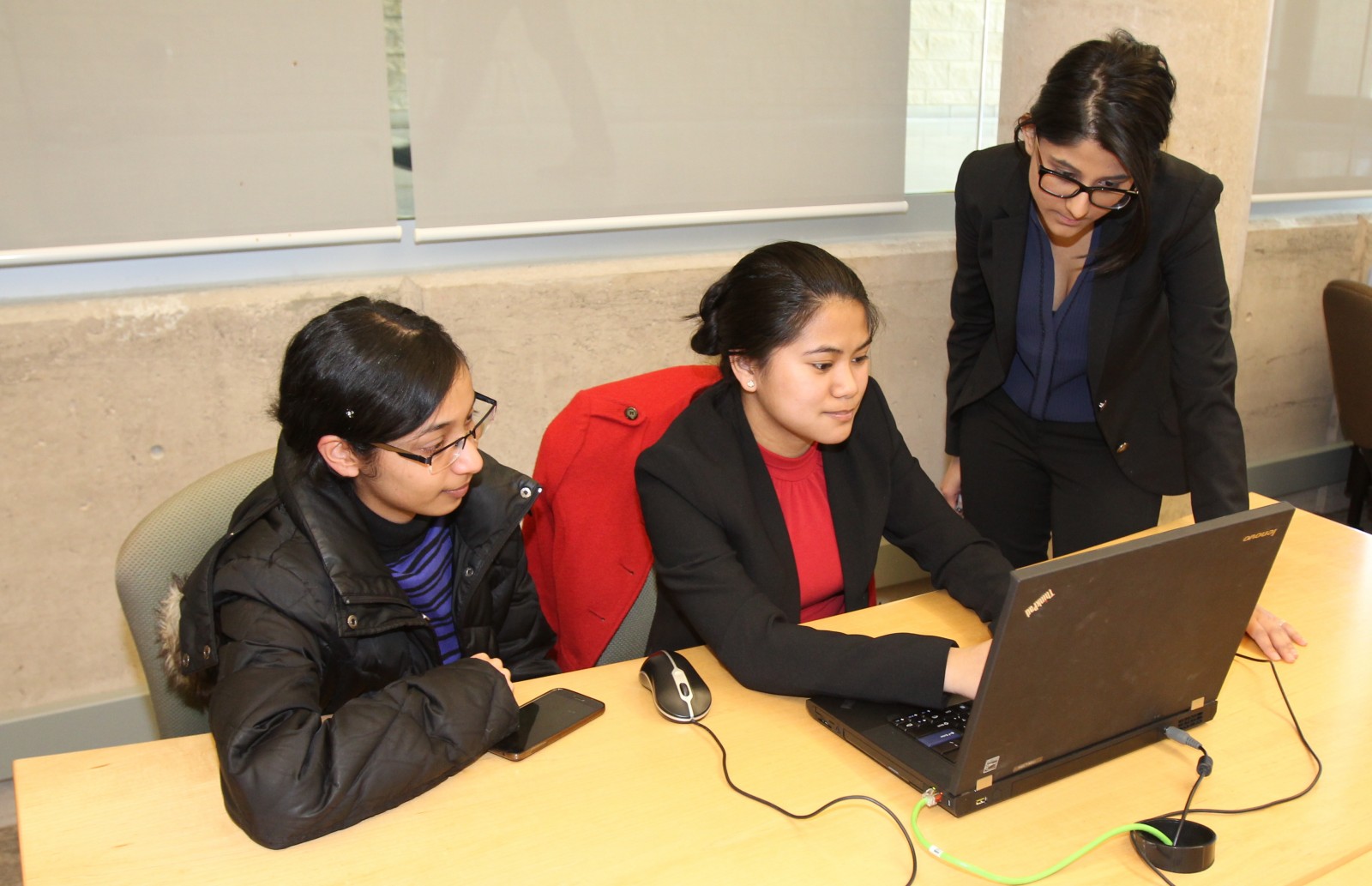 Student Feby Jose, left, gets tax preparation help from Accounting Co-Op students Alyssa Gambel and Shreya Verma.
Student Feby Jose, left, gets tax preparation help from Accounting Co-Op students Alyssa Gambel and Shreya Verma.The path from academic study and experiential education to graduation and starting a career is more clearly defined, now that Brock has become Canada’s first university to have its Senate adopt a set of definitions for the experiential education that students receive.
How significant is it? Enough that university officials across the country have been calling to ask how Brock did it. Enough that high school guidance counsellors and co-op teachers at a recent workshop burst into applause when this was announced.
We are helping to bridge the gap between academic learning outcomes and transferable employment experience.
Experiential learning opportunities are increasingly important to students. Statistics Canada’s 2013 National Graduates Survey found that graduates with a bachelor degree and co-op experience earned more than their peers, had higher full-time employment rates and were more likely to pay off their debt within two years.
Royal Bank of Canada CEO Dave McKay, writing in the Globe and Mail last year, urged universities to find more ways “to get students on the right path and … the best way to do that is through work-integrated learning.”
Brock’s agreement sets a new precedent in that direction. Defining and categorizing experiential learning means more opportunities for students to gain transferable skills that lead to careers after graduation.
Cara Boese, Brock’s Director of Co-Op, Career and Experiential Education, said the clarity created by firm descriptions helps solve an age-old chicken-and-egg dilemma.
“People ask, ‘How can you get a job if you don’t have experience, and how can you get experience if you can’t get a job?’” said Boese. “We’re answering those questions. We are helping to bridge the gap between academic learning outcomes and transferable employment experience.
“You can come to Brock and have that rich university learning experience, use critical thinking, gain knowledge and graduate with a degree, but also gain the experience you require to start down your desired career path.”
Boese said the adoption of formal definitions allows the University to measure, track and report on experiential education, as well as support efforts across campus to review and renew curriculum. Clear definitions also help faculty integrate more experiential opportunities into their courses, and improve Brock’s ability to recognize a wider range of experiential learning opportunities that will benefit students.
“We are connecting theory and practice in a meaningful way that helps students not only learn, but better understand and discover their own career aspirations and passions,” Interim President Tom Traves said. “It’s what differentiates us from other universities.”
Before Brock’s Senate adopted the measures, a small group of faculty and staff spent nearly a year consulting with senior administration, deans, experiential staff, students and others from across Brock’s seven faculties. They also consulted with the University of Victoria, a leader in developing experiential education definitions in B.C.
The result is a new set of distinct definitions for Brock’s 27 curricular and co-curricular experiential learning opportunities.
About half of the University’s more than 18,000 students get some level of hands-on work experience during their time at Brock through some form of experiential learning.
Officials say they are now positioned to radically increase that level of engagement. The new definitions, coupled with the hiring of Experiential Education co-ordinators in all of the University’s faculties, should result in every student getting at least one experiential opportunity during their studies at Brock. The longer-term target is two opportunities each.
“Our goal is to work with faculty in order to increase the number of experiential learning opportunities within courses,” said Boese.
“At the end of the day, a student at Brock will have more opportunities to engage in experiential learning, reflect on these experiences, and thereby develop skills and competencies to help them achieve their career goals.”
If you’ve got ideas for experiential course opportunities, or would like more information, please contact Sandy Howe at showe@brocku.ca
FACT BOX: CCEE Success Stories
Applied Health Sciences
I-EQUIP (Interprofessional Education for Quality Improvement Program) projects bring together students from Brock, McMaster’s Medical School and health professionals from Niagara Health to implement and sustain quality improvements in the health system. Students go on to have excellent experience as they transition to work in the field of health care and quality improvement.
Humanities
Advanced Archaeological Fieldwork in Greece: students study at the archaeological site of Gournia in Crete, Greece. Advanced techniques of archaeological survey, excavation, data recording, finds processing and analysis accompany their work on the archaeological dig.
Math & Science
Computer Science — Mobile Computing: This course has successfully integrated Service Learning for the first time with a group of students creating a mobile app for a local small business. The long-term goal is to see the department shift into a type of hub where companies can bring their app needs and request and have students work to fulfill them.
Social Sciences
Communications, Pop Culture & Film fourth-year practicum: students participate in a service-learning style internship that takes them out into the community for 180 hours over the course of the year. They work with companies and non-profit organizations on communication projects, marketing, event planning, social media design, video creation and more.
Goodman School of Business
Data Analytics: Using a real-world case, students identify a problem that can be addressed through business analytics/data mining techniques. Students then present their community partner with a text analytics report using various social media or web-based domains.
Here’s an example of the type of Experiential Education opportunities offered to Brock students:









